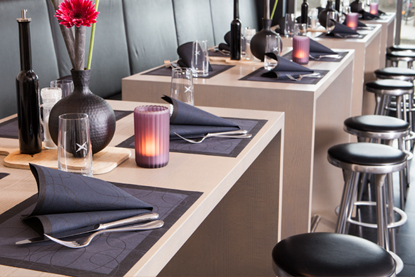CEO statement
Stable finances and a platform for growth
2012 as a whole was a weaker year for Duni than the preceding year. More restrained demand on our main markets combined with unfavorable exchange rates and lower capacity utilization at our production plants resulted in reductions in both sales and income compared with last year. To a certain extent the lower capacity utilization rate was dictated by lower production volumes, but it was also a consequence of reduced inventory levels ─ a factor which contributed to the strong cash flow for the year.
Sales amounted to SEK 3,669 (3,807) m and operating income to SEK 340 (404) m. Adjusted for exchange rate movements, net sales declined by 1.6% and operating income fell by SEK 52 m compared with the preceding year.
Within the Professional business area, Duni’s work on increasing the use of premium products, and success in inducing customers away from the use of linen, led to increased market shares on several markets. This was achieved despite a decline in the number of visits and average spend on the European restaurant and hotel market. Duni also demonstrated growth within the take-away sector and on our export markets.

All in all, operating income within the Professional business area amounted to SEK 336 (357) m, entailing an operating margin of 12.5% (12.9%).
In the Consumer business area, sales were down on last year. Following a weak start to the year, Consumer won a number of new customers, which resulted in a gradual improvement in both product mix and relative profitability during the year.
Operating income was SEK 5 (21) m, entailing an operating margin of 0.9% (3.4%).
The Tissue business area began the year with relatively high inventory levels which, combined with low sales, had a negative impact on operating income. In addition, airlaid material, which is produced and sold to external customers within the hygiene products area, demonstrated a decline in profitability due to an unfavorable product mix and costs associated with the development of new products within the area. As a consequence of these factors, the Board of Directors decided to commence negotiations with the unions regarding the closure of this production unit.
Tissue’s operating income was SEK -1 (25) m and the operating margin was -0.2% (5.9%).
Foundations laid for future growth
During the past five years, Duni has carried out major infrastructure investments, built up sales organizations on new markets, and developed new materials and products. Efficiency has been gradually improved and profitability established on a stable level. The Company enjoys financial stability and possesses a platform which can carry significant growth initiatives.
During the second quarter of 2012, the organizational structure was changed with the aim of creating clearer focus on the three areas from which growth is expected to come: Table Top, i.e. the set table among customers within the HoReCa (Hotel, Restaurants and Catering) sector; Meal Service, focusing on the take-away trend; and within geographic expansion.
Within Table Top, the strategy is based primarily on inducing customers who use linen tablecoverings to switch to Duni’s paper-based tablecovering products. Duni is the market leader among customers who currently use premium single-use products. Nevertheless, single-use products are used by only 20% of the HoReCa market. Consequently, it remains to conquer 80% of the market – merely on our domestic markets! In order to increase the rate of switchover, we need to define a clearer core market on which we can better concentrate our sales and marketing resources.
The launch of Evolin® in 2011 represented an important step in the right direction for supporting the switchover strategy since, to a very high degree, Evolin combines the feel and look of textile and linen tablecoverings with the advantages of single use products. This project had a negative impact on income in 2012, since we were still in an expansion phase, but we are convinced that Evolin will be one of the major products in our range within a few years.
In addition to the switchover strategy within Table Top, we also perceive major opportunities to take advantage of the possibilities opened up by segment convergence within the restaurant industry. Restaurant chains with clear concepts and strong brands are gaining market shares in the area we refer to as the take-away sector. As far as Duni is concerned, it is primarily in the "Fast Casual" and "Quick Service" segment (i.e. fast-food restaurants) that we perceive opportunities. Duni is responding to the growing demand by developing attractive function and design solutions in close cooperation with many of the leading restaurant chains. Developing customized table setting concepts and take-away packaging which strengthen the customer’s brand profile constitutes an important aspect of this cooperation. Within Duni, this area is growing more quickly than the market in general.
Geographic expansion within the HoReCa sector represents a third growth area. We perceive the greatest growth opportunity on markets which are adjacent to Duni’s main markets. Investments made on these markets demonstrate strong growth, albeit from low levels. In Russia, for example, we have developed a new organization focusing on the 21,000 hotels and restaurants in the country. Duni's sales in Russia are growing at 45% a year. We have witnessed the same positive growth for several years in Italy; however, our assessment is that growth has slowed down somewhat due to the weak economies of southern Europe.
The average growth rate on Duni's prioritized markets outside Europe is 20%, and work on increasing sales is being intensified also here. For several years, the Middle East has been Duni's largest export market, while metropolitan areas in the Asia-Pacific region and South America are demonstrating levels of growth which justify a greater number of, and more forceful, initiatives, particularly in those places where conditions are deemed favorable for establishing local conversion in the long term. In the Asia-Pacific region, focus is primarily on cities such as Singapore, Hong Kong, Tokyo and Sydney, but in the long term opportunities will be offered by other major cities in the region.
Great intrinsic potential
Duni has chosen a business model in which most of the product range is vertically integrated. The model, together with our size, generates economies of scale since the breakeven point for product profitability is lower than at most competitors. The combination of our own range with unique solutions developed for, e.g. take-away, creates a potential which we are not exploiting to the full.
There is great intrinsic power in Duni's innovation capability and strong market organization. It is difficult for our competitors to copy these skills.
All in all, Duni's 2012 financial year demonstrates weaker profitability, but at the same time a stable cash flow and a strong balance sheet. Duni is well invested and we are the market leader on many of our markets. By taking a number of measures, we will have cogent possibilities to expand the business both on our domestic markets and growth markets. We are now embarking on the next stage of the journey and focusing our efforts on growth in all its forms.
Malmö, March 2013
Thomas Gustafsson
President and CEO
Här kan man lägga lite text.
Denna text ska till höger


